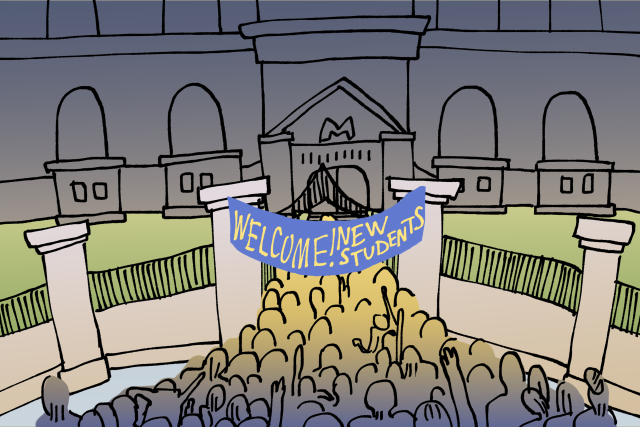[ad_1]
Over the last two years, college enrollment has increased across the nation following a decline during the COVID-19 pandemic. This year, the University of Michigan saw a record number of total enrollment, with undergraduate enrollment increasing from 33,730 to 34,454 since last year. More young people are pursuing higher education and, in a world where more and more jobs require a postsecondary education, this should be a good thing. However, colleges are accepting more students than they can handle, which hinders the college experience for these admitted students.
An exceptionally damaging year of over admittance to colleges can likely be traced back to one main culprit: the Free Application for Federal Student Aid. Last year, a new FAFSA form was released, and with it came issues that left students and universities panicked. The form was first available three months later than usual, and it had many glitches and errors that resulted in universities scrambling to verify applicant information and provide the right amount of aid. The botched rollout caused major delays in schools receiving applicants’ information and, in turn, distributing financial relief awards to students.
With the cost of college being a major factor for many students choosing where to attend college, a late roll out of financial aid can drastically impact their final decision. The typical May 1 deadline for college decisions was unrealistic, as most students did not receive their financial aid package until much later. Students who could have otherwise committed to other colleges, may have instead committed to cheaper, in-state options, contributing to over enrollment. Without knowing how much money they will receive from a university, students potentially must “settle” for the schools they know that they can afford. Financial aid is absolutely crucial for many students when it comes to deciding where they want to attend college, but the issues relating to over admittance persist long after a student enrolls in college.
This year, the University of Michigan reported an incoming undergraduate class for fall 2024 of 8,858 students. In an email to The Michigan Daily, Heather Guenther, the University’s director of communications for student life, stated that Michigan Housing reserved about 7,500 spaces for first-year students this fall. Housing demand is drastically exceeding supply at the University and in Ann Arbor, and it is unreasonable to leave new students scrambling for housing. The University of Michigan, and colleges across the nation, should not be accepting and enrolling more students than they can accommodate in their on-campus housing.
This is not just an issue at the University of Michigan. Colleges across the country are placing their students in hotels or offering commuting incentives because they cannot accommodate for the full number they accepted. This is not the college experience they signed up for. While I certainly wouldn’t have minded staying in a cushy hotel with a private bathroom instead of an outdated dorm, students should not be forced to scramble last minute for housing because of poor university planning. The delay in the FAFSA rollout only compounded the disastrous effects of this national trend.
At the University of Michigan, over admittance is reflected not only in a housing shortage, but also in the hectic and stressful nature of class scheduling. Some of the worst moments of each semester for students happen when they have to balance their exams with scheduling classes for the next semester. There is aggressive competition between students as they try to schedule for spots in limited classes, warring against an unknown peer trying to do the same. The increasing volume of students being admitted into the University does not help this issue at all. Instead, it makes classes even more inaccessible, especially for students who come into college with no AP or IB credits.
College admissions has become a fiasco that causes more stress for students at an already tumultuous time. Students have to make a huge life decision about where they want to study and what they want to do, and are now met with the uncertainty of financial aid, housing, scheduling and more.
Each year, colleges have to make the difficult decision of how many applicants they accept and gamble on how many of those students will actually enroll. It can be hard to manage, but first and foremost, schools must consider the students they already have on campus. By enforcing strict enrollment limits that correspond to the University’s ability to accommodate, the student experience becomes better for everyone. It is time to focus on the quality of the college experience, over the quantity of degrees rolled out.
Lara Tinawi is an Opinion Columnist writing about campus culture and her everyday musings in her column “Daily Dose.” She can be reached at ltinawi@umich.edu.
Related articles
[ad_2]
Source link











